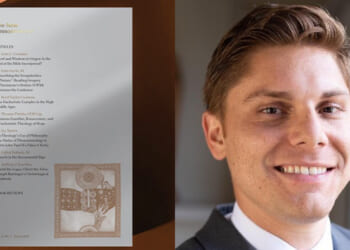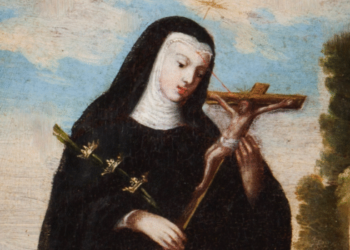It will take me quite a while to unpack everything from my dad’s recent and sudden death. A Discalced Carmelite Friar told me it takes a minimum of 5 years to grieve. That makes sense in cases like the loss of a father. I’m still in the period of mourning when I cry most days. It feels like it’s been forever since he died, and yet it has only been two months.
The hardest part is not being able to talk to him on the phone anymore. He just missed the election of the first American pope, and while it is very small in the grand scheme of things, my dad was an avid baseball fan, and I’d love to talk to him about the pope being a baseball fan. If memory serves, my dad had a period when he liked the White Sox (or maybe that was just me), even though he died a San Francisco Giants fan. His dad was an avid Atlanta Braves fan, so my dad rooted for them for much of the 90s, since Montana does not have its own baseball team.
I think, much like me right now, his love of baseball remained a connection to his dad when he died in 2001. My dad loved baseball so much that my youngest sister’s nickname is for Mookie Wilson, who played for the Mets and Blue Jays in the 80s. It was an ordered love, though, not the fanatical false idol of too many who follow sports in our day.
As I pray and ponder the last two months—I received the phone call that he was dying two months ago to the date as I write this—I am struck by the mystery of the Cross that is revealed in the death of a loved one and the unexpected strength and graces that come through the experience. For years, my husband worried that I would completely fall apart when my dad died. He was the person I was closest to for years before I married and had my own family. My dad gave me a love of philosophy and theology and the Catholic Faith, which gave us a deep bond.
There was a moment when my dad was in his final 24 hours, when I was asked: “How can you be so calm?” It is an important question. I never expected to be at peace as my dad lay dying next to me, but that is because I lacked faith and understanding of the great graces the Lord pours into us at the foot of the Cross. Since the Lord in His mercy did supply those graces, I was able to unhesitatingly answer: “Prayer.” I could never have survived the agony of my dad’s final passion and death without turning to the Lord repeatedly in prayer. I begged Him for the strength I needed to endure it all, and He provided in abundance.
This is where our witness is essential. We should look different from the rest of the world when we come face-to-face with the tremendous sufferings of this life, especially death. Our presence should be one of quiet love, strength, and peace. It is the supernatural virtues of faith, hope, and charity that make this possible. I knew that my dad’s suffering had a purpose in God’s Divine plan. He and I discussed it in the last coherent conversation I had with him 6 days before he died. Our sufferings are redeemed when we unite them with Christ on the Cross, and the Lord uses those sufferings in His plan of saving souls.
It was this knowledge and belief in redemptive suffering, which the Lord taught me in prayer through much of my own personal suffering and loss over the years, that allowed me to walk with my dad. It is through years of abiding in Him in prayer that prepared me for the death of my father. It will be my continued abiding in Him that will provide the graces necessary for future sufferings that await me.
The Lord tells us to remain in Him. We can do nothing through our own power. We must rely totally on Him. In John 15:1-9, He says to us:
I am the true vine, and my Father is the vine grower. He takes away every branch in me that does not bear fruit, and every one that does he prunes so that it bears more fruit. You are already pruned because of the word that I spoke to you. Remain in me, as I remain in you. Just as a branch cannot bear fruit on its own unless it remains on the vine, so neither can you unless you remain in me. I am the vine, you are the branches. Whoever remains in me and I in him will bear much fruit, because without me you can do nothing. Anyone who does not remain in me will be thrown out like a branch and wither; people will gather them and throw them into a fire and they will be burned. If you remain in me and my words remain in you, ask for whatever you want and it will be done for you. By this is my Father glorified, that you bear much fruit and become my disciples. As the Father loves me, so I also love you. Remain in my love.
He nourishes us through our union with Him as the vine. If we do not live in intimate union with Him in prayer, we will not be able to endure hardships or glorify Him through our works. We will wither and fade, and eventually spiritually die. This is why activism is such a pernicious lie of our age. We have been told for decades that we need to be doing lots of things for the Lord. We cannot do anything for the Lord if we are not first and foremost people of prayer. Our works can only give glory to God in the measure that we are nourished by Him in prayer and the Sacraments.
In difficult moments, we are able to give glory to Him and do things well beyond our personal strength because He dwells within us and we dwell in Him. His love is poured into us through this intimate union we share with Him. It is this love that we can share with those around us. It is this love that strengthens us. In 1 John 1:18 we are taught, “Perfect love casts out all fear.” It is this love of God dwelling within us that drives fear from our hearts. This love leads us to respond generously and fearlessly in situations where the world despairs. This despair is seen most clearly in the face of death. Our culture lives quiet despair in the face of death every single day.
This does not mean that I am not grieving. I was given great graces in the moment, but once my father died, the grief set in. My grief is not despair. It is the pruning away that occurs with separation. My dad is now more alive than I am, but I must confront his physical absence and the reality that I won’t hear his voice again in this life. We still live the sorrow of the Cross in this life, even as we rest in sure hope of eternal life. It is in this experience of sorrow that the Lord leads us to abide even deeper in Him through prayer.
It is this sure hope that allows us to grieve differently. The tears I shed are the agony of loss that is mingled with the fervent hope that my dad is with the Lord, or at least on the way, if he is in Purgatory. In St. Paul’s First Letter to the Thessalonians 4:13-18, we are instructed in Christian grief:
We do not want you to be unaware, brothers, about those who have fallen asleep, so that you may not grieve like the rest, who have no hope.
For if we believe that Jesus died and rose, so too will God, through Jesus, bring with him those who have fallen asleep.
Indeed, we tell you this, on the word of the Lord, that we who are alive, who are left until the coming of the Lord, will surely not precede those who have fallen asleep.
For the Lord himself, with a word of command, with the voice of an archangel and with the trumpet of God, will come down from heaven, and the dead in Christ will rise first.
Then we who are alive, who are left, will be caught up together with them in the clouds to meet the Lord in the air. Thus we shall always be with the Lord.
Therefore, console one another with these words.
It is this hope, which is constantly nourished through prayer, that allows me to continue on the path of grief. The Lord gave me the strength I needed through prayer to walk with my dad the final path to Calvary. Now, it is prayer that unites me even more deeply with the Lord as I suffer the temporary separation from my dad.
The Christian who does not lead a life of deep prayer will be unable to weather peacefully the dark storms of life. Our witness to others and our ability—through God’s grace—to grieve and act like Christians in the face of death is intimately connected to how much we abide in Him. It is this intimacy and union with Him that allows us to invite others to trust in Him when confronted with the stark reality of death.
Photo by Olivia Snow on Unsplash
















